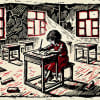Students brought hope for change to this city, demonstrating the power of unity. After the sudden collapse of the previous government, with the police force absent, the entire country was left vulnerable. Every house and every road were at risk. In this critical time, the youth of Bangladesh took to the streets to control traffic and ensure safety from looting and robbery. Some students overstepped boundaries, leading to conflicts between them and the public as they attempted to maintain order.
I'm not here to take sides, but I want to ask: Why are we so quick to question the students when reports started coming in of some crossing the line?
The question highlights a larger issue—the failure of our education system to prepare young people for the responsibilities of citizenship. If we had invested in teaching values, respect, and the principles of civic duty, perhaps the situation could have been different.
As a parent, I've learned that children imitate us. Our inner battles are the ones our children will fight. So, I started with myself. I discovered that happiness is not found outside; it's an inner world. We must teach our children that if we want respect, we should give the same level of respect to others. The journey begins when we learn to love ourselves, accept our flaws, and draw closer to our faith.
The traditional education system focuses heavily on academic success, often framing it in terms of grades, promotions, and the ability to compete in the job market. But is this all there is to education? Or is there a deeper, underlying purpose at play?
One could argue that the system is designed not only to prepare students for future careers but also to keep them preoccupied, ensuring they remain focused on the race for success without questioning the broader implications of their education.
This approach perpetuates a cycle where each generation is groomed to fit into a competitive framework, leaving little room for creative thinking, self-discovery, or the exploration of alternative ways of living and contributing to society. Education becomes less about holistic development and more about producing individuals who can function efficiently within a predetermined system.
Imagine if, from a young age, children learned about the rights and responsibilities of being a good citizen, understood the impact of their actions on others, and recognised the importance of empathy and respect. If we instil these values early on, children are less likely to stray down negative paths.
It's not enough to simply react to bad behaviour; we need to be proactive in shaping the character of our future generations. Schools must take on the responsibility of teaching these essential lessons, ensuring that all children, regardless of gender, grow up understanding the importance of respect, consent, and empathy. Only then can we hope to break the cycle of normalised violence and truly foster a society of good citizens.
We need to start a revolution within ourselves. It's time to rethink how we educate our children—not just for academic success, but for life. We need to teach them to be good citizens, to be kind, to be self-aware, and to be strong. Only then can we hope to create a world where they lead with integrity, compassion, and purpose.
Speaking to other parents, I realize that many of us share a similar concern: Are we truly preparing our children to be good humans? Many of us rely heavily on our religious teachings, based on individual understanding, instructing them on what to do and what not to do. However, is this approach sufficient? Are we truly preparing them to be good humans? We need to model the behaviour we want to see in our children. If we preach values, we must practice them ourselves. Teach them that happiness is within them, that loving themselves first is akin to loving religion
If we teach our children that their worth comes from within, they will learn to respect others, to be kind, and to understand their power. This internalisation of values is crucial for their development as responsible citizens.
Disclaimer: The views and opinions expressed in this piece are those of the writer.








Comments